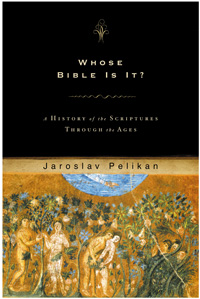|
||
      |
Peer Review ::
Who can lay claim to the Bible?
Christianity scholar Jaroslav Pelikan asks who owns the Good Book.
 Decades
after his Russian-born aunt stumped him with a casually posed question,
“Tall me, vot do you tink of Bible?” Jaroslav Pelikan, PhD’46,
has set out to answer his “dear Aunt Vanda.”
Decades
after his Russian-born aunt stumped him with a casually posed question,
“Tall me, vot do you tink of Bible?” Jaroslav Pelikan, PhD’46,
has set out to answer his “dear Aunt Vanda.”
In Whose Bible Is It? A History of the Scriptures Through the Ages (Viking), Pelikan, Yale’s Sterling professor emeritus in history and a prolific author on historical Christianity, begins to address his title question by taking a look at the modern Bible. Its reader, whether Jewish, Catholic, Protestant, or otherwise, he writes, “has the right to expect ‘the Bible, the whole Bible, and nothing but the Bible.’” Yet, in addition to the proliferation of English translations, significant differences exist among sects and religions—Christians include the New Testament, for example, and Roman Catholics also add the Apocrypha.
Tracing the Scriptures’ history, Pelikan, himself a lifelong Lutheran, explores similarities and differences between each Bible—and how the differences arose. Transcription and translation, he explains, played a major role. As the original oral Aramaic was written, translated to Greek, and retranslated to other languages, subtleties sometimes became obscured. John the Baptist, for example, exclaims, “Do not imagine you can say, ‘We have Abraham for our father.’ I tell you that God can make children for Abraham out of these stones” (Pelikan’s italics). “Interpreters of this passage,” he writes, “were often puzzled about what connection, if any, there is between ‘children’ and ‘stones.’” Retranslating the passage, however, reveals a play on words: in the original “children” is banim and “stones” ebanim.
More significant changes also occurred as the Bible was translated, disseminated, and then interpreted for centuries by Christians who could not read Hebrew. “For two-thirds of its history,” Pelikan explained in an April NPR interview, “Christianity has had to read Jewish Scripture in translation, and so whatever was lost by translation was filtered out.” Recent collaborative scholarship for new translations, Pelikan said, is encouraging. “But there’s also a lot of catching up to do.”
The Scriptures’ history, in fact, makes the question, Whose Bible is it? “not only presumptuous but blasphemous,” he writes. With the Bible’s unprecedented distribution and circulation, it belongs not only to Christians and Jews but to “the whole of humanity.”
In the end, he dodges Aunt Vanda’s inquiry, focusing on what hundreds of generations before him have thought. “I duck by retreating 20 centuries,” he told NPR, “and by the time I’m done reciting 20 centuries, people are pretty near exhausted and then can’t subject me to cross-examination.”